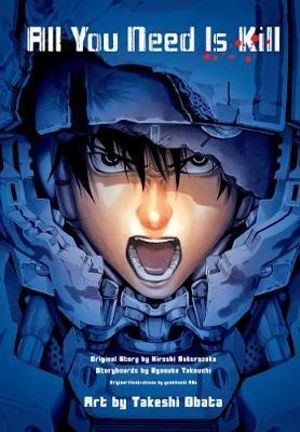All you need is kill by Hiroshi Sakurazaka
The importance of commanders reading fiction – and in particular science fiction, to explore command, leadership and warfare from a different perspective is once again reiterated in ‘All you need is kill’.
This novel explores the world of Keiji Kiriya, a member of the futuristic Japanese UDF armoured infantry who are fighting against an alien invasion of beasts they call ‘mimics’. During his first battle out of training, Keiji get’s caught in what can only be described as one hell of a ‘Groundhog day’ where for some reason he keeps reliving the day of that first battle, and continues to die.
The book explores many themes, the most important of which is the determination and resolve of Keiji when he realises what is happening to him and decides that instead of wasting what he calls ‘the loop’, using the time to master the art of soldiering. He becomes an expert in the use of his ‘jacket’ which is his armoured suit, as well as his own weapon system before advancing to others. Keiji develops an understanding of his enemy and of the different types of command on the battlefield in order to become the ultimate killing machine.
In the process of his time in ‘the loop’ Keiji studies the ‘Full metal bitch’, a female US Special Forces soldier with a reputation as one of the best on the battlefield. Through his study of her, he learns the nuances of how to predict the movements of the enemy and control his every action to best effect.
This novel is written from a very human perspective, with typical soldier sentiments and cursing throughout. One of the points that I took away from the book that I have always tried to ensure that I do is the importance of getting involved in the hard tasks that the soldiers are conducting. Whether it be in PT, like the case in the novel ‘my squad has never participated in this form of PT, Sir. I believe my participation could be vital in ensuring the successful coordination and execution of tomorrows joint operation’; or in something as simple as cleaning, commanders should be involved wherever possible in order to foster greater teamwork and trust.
Another great lesson is utilising every moment to be the best you can be. If you are spending ten to twelve hours each day in barracks at work, that time should be utilised toward the continued improvement of your knowledge and skills, which can then be tested and honed in the field and on operations. This idea is not specific to any corps or role and as professionals in our field, we should strive for our continued personal growth.
A point that I took out of this novel that coincided with the same point I have read in several non-fictional accounts of Australian leaders in various wars is that of being an example when subordinates are tired, nervous, or in the case of real time war, scared. In this novel the ‘Full metal bitch’ paints her armoured jacket blood red which sends a beacon of hope and acts as an example on the battlefield to other soldiers when they see her, ‘just a glimpse of her jacket on the battlefield would drive soldiers to give another ten percent’. Sir Stan Savige, an Australian General, apparently stood outside his headquarters in WWII as a Brigadier and shaved his face whilst German Stukas where bombing to show his soldiers that there was nothing to be afraid of. This demonstration prevented soldiers from abandoning their posts.
Many other minor lessons and points can be drawn out of this novel, not all military, such as the way that we treat our environment. The beauty of science fiction is that each reader will draw many different points from the novel as they overlay the lessons on to their own unique circumstances and experiences, as opposed to reliving someone else’s.
All you need is kill is well paced and well written. My only critique of the novel is that I lost sleep reading it as I had to finish it in one sitting. I would recommend this short novel to any junior leader that enjoys science fiction or is just starting to explore the world of science fiction novels as it focuses less on the technology utilised or enemy faced and more on the relatable aspects of soldiering.
One final part of the novel that I would like to share that I thought was simply brilliant is the following extract on fear:
‘But even as fear racks my body, it soothes me, comforts me. Soldiers who get washed away in a rush of adrenalin don’t survive. In war, fear is the woman your mother warned you about. You knew she was no good for you but you couldn’t shake her. You had to find a way to get along, because she wasn’t going anywhere.’
Jess Ward is a currently serving Australian Army Officer with over a decade of experience. Jess has commanded within Combat Brigades, on Operations and as an instructor. Jess has been published in ‘Winning Westeros: How Game Of Thrones explains modern military conflict’ as well as several professional military education websites. Jess curates The Bookshelf. Follow Jess at @JessPixWard.

